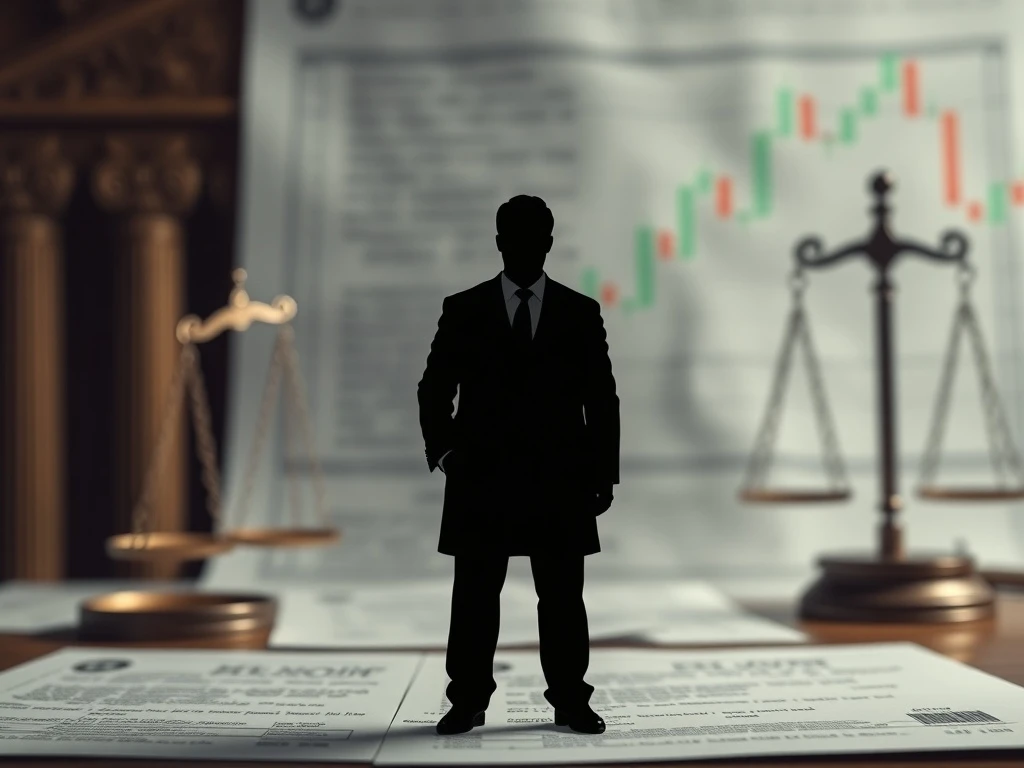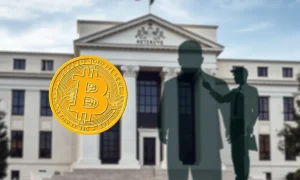For entrepreneurs and business leaders in the dynamic cryptocurrency space, the legal developments surrounding **Do Kwon**, co-founder of Terraform Labs, remain a focal point. A significant update has emerged: a federal judge has scheduled a conference where Kwon may alter his plea in a high-profile criminal case. This development could reshape the trajectory of his legal battle and send ripples across the global crypto market.
Do Kwon’s Pivotal Plea Change: A Legal Turning Point
The cryptocurrency world is closely watching the unfolding legal drama involving **Do Kwon**, co-founder of Terraform Labs. Just recently, a federal judge overseeing his case scheduled a Tuesday conference. During this session, the Terraform Labs co-founder “may enter a change of plea.” This announcement arrived via a Monday filing in the US District Court for the Southern District of New York (SDNY). Judge Paul Engelmayer issued the order, requiring all parties to appear in court on Tuesday. Consequently, this suggests that Kwon might be preparing to change his plea for some or all of his previously filed charges.
Previously, in January, Kwon pleaded not guilty to a series of serious felony counts. These charges included securities fraud, market manipulation, money laundering, and wire fraud. His initial plea followed a prolonged extradition battle in Montenegro, which ultimately resulted in his removal to the United States. The legal proceedings have drawn significant attention. This is primarily due to the immense impact of the Terra-LUNA ecosystem collapse, which erased billions in market value.
Understanding the Charges Against Do Kwon
The charges against **Do Kwon** are extensive and severe. They reflect the alleged financial misconduct that led to the dramatic collapse of the Terra-LUNA ecosystem in May 2022. Understanding these charges is crucial to grasping the gravity of his legal situation. Specifically, Kwon faces nine felony counts, each carrying significant penalties:
- Securities Fraud: This charge alleges that Kwon and Terraform Labs misled investors about the stability and security of their digital assets, particularly the TerraUSD (UST) stablecoin. Prosecutors claim they misrepresented the algorithmic stablecoin’s ability to maintain its peg to the U.S. dollar.
- Market Manipulation: Authorities accuse Kwon of manipulating the market to inflate the value of Terra (LUNA) and UST. This includes allegations of using undisclosed means to prop up UST’s price, creating an artificial sense of stability.
- Money Laundering: This charge suggests that Kwon engaged in financial transactions designed to conceal the origin of illegally obtained funds. Such activities often involve moving money through various accounts or jurisdictions to obscure its true source.
- Wire Fraud: The wire fraud charges relate to the alleged use of electronic communications, such as emails or phone calls, to defraud investors. This typically involves schemes designed to obtain money or property through false pretenses.
Each of these charges carries substantial prison sentences and financial penalties. Therefore, a change of plea could signify a strategic shift in his defense.
The Long Road to US Jurisdiction: Do Kwon’s Extradition Saga
The journey to bring **Do Kwon** to face justice in the United States has been long and complex. Following the collapse of Terra-LUNA, Kwon became a fugitive. South Korean authorities, his home country, issued an arrest warrant for him in September 2022. Subsequently, Interpol issued a red notice, signaling an international request for his arrest.
Kwon was eventually apprehended in Montenegro in March 2023. He was arrested for using falsified travel documents while attempting to board a flight to Dubai. This arrest triggered a protracted legal battle over his extradition. Both South Korea and the United States sought his extradition. The Montenegrin courts faced a challenging decision, weighing competing requests and legal arguments. Ultimately, after months of appeals and judicial proceedings, a Montenegrin court approved his extradition to the United States. This decision paved the way for him to face the criminal charges in New York, marking a significant victory for U.S. prosecutors.
What a Change of Plea Means for Do Kwon
A change of plea in a criminal case is a pivotal moment. It indicates a defendant’s decision to alter their previous ‘not guilty’ plea to a ‘guilty’ or ‘no contest’ plea. For **Do Kwon**, this could mean several things:
- Negotiated Agreement: Often, a change of plea is the result of a plea bargain. In such an agreement, the defendant agrees to plead guilty to certain charges in exchange for concessions from the prosecution. These concessions might include dropping other charges, recommending a lighter sentence, or agreeing to a specific sentencing range.
- Allocution: Judge Engelmayer’s order specifically mentioned that “the defendant should be prepared to give a narrative allocution.” Allocution is a formal statement made by a defendant in court. In this statement, they admit to the facts of the crime(s) to which they are pleading guilty. It must incorporate all elements of the offense. The judge encouraged counsel to assist Kwon in writing this allocution for clarity and efficiency during the proceeding.
- Expedited Resolution: A guilty plea can significantly shorten the legal process. It avoids a lengthy and costly trial, moving directly to sentencing. This can be beneficial for both the prosecution and the defense, saving resources and reducing uncertainty.
- Sentencing Implications: Pleading guilty often leads to a more lenient sentence than if a defendant is found guilty after a trial. This is because defendants who accept responsibility for their actions may receive credit for cooperation or remorse. However, the specific sentence will depend on various factors, including the severity of the crimes, Kwon’s criminal history (if any), and federal sentencing guidelines.
This potential plea change could be a strategic move to mitigate the potential consequences of a full trial. It suggests a significant shift in his legal defense strategy.
Implications for Terraform Labs and the Crypto Landscape
The legal developments surrounding **Do Kwon** extend beyond his personal fate. They carry significant implications for Terraform Labs and the broader cryptocurrency landscape. Firstly, a guilty plea could further solidify the narrative of corporate misconduct within the company. This may impact any remaining assets or ongoing legal battles involving Terraform Labs itself, including civil cases. Secondly, this case serves as a powerful precedent for regulatory bodies worldwide. It underscores the increasing willingness of authorities to pursue criminal charges against individuals involved in alleged crypto-related fraud. This could lead to stricter enforcement actions against other projects and founders.
Furthermore, the outcome of Kwon’s case may influence investor confidence. A resolution, even if it involves a guilty plea, could bring a sense of closure to victims of the Terra-LUNA collapse. This might help rebuild trust in the digital asset market, provided that accountability is clearly demonstrated. Conversely, any perceived leniency could undermine efforts to regulate the volatile crypto space effectively. The market’s reaction to such news is often immediate, reflecting both relief over clarity and concern over potential regulatory crackdowns.
The Interplay with the SEC Civil Case
It is important to note that the criminal case against **Do Kwon** runs parallel to a separate civil lawsuit filed by the U.S. Securities and Exchange Commission (SEC). The SEC’s complaint, filed in February 2023, alleges that Kwon and Terraform Labs offered and sold unregistered securities. They also claim the entities engaged in a multi-billion dollar crypto asset securities fraud scheme. This civil case seeks disgorgement of ill-gotten gains, civil penalties, and injunctive relief.
The outcome of the criminal proceedings could significantly impact the SEC’s civil case. For instance, a guilty plea in the criminal case could be used as evidence in the civil trial. This would strengthen the SEC’s position. Conversely, if Kwon were to secure a favorable outcome in the criminal case, it might complicate the SEC’s efforts. The dual nature of these legal battles highlights the comprehensive approach U.S. authorities are taking to regulate the crypto industry. They are using both criminal prosecution and civil enforcement to address alleged wrongdoing.
Do Kwon’s Future and Investor Confidence
The potential change of plea by **Do Kwon** marks a critical juncture. His future, previously shrouded in uncertainty due to his fugitive status and extradition battles, now faces a clearer path towards resolution. The legal process, however, remains intricate. Even with a guilty plea, sentencing can be a complex and lengthy process. It involves considerations of federal guidelines, victim impact statements, and other mitigating or aggravating factors. The final judgment will undoubtedly set a precedent for how high-profile crypto figures are held accountable for their actions.
For investors, this development could be a double-edged sword. On one hand, it represents a step towards justice for those who suffered losses during the Terra-LUNA collapse. This might restore some faith in the enforceability of laws within the crypto space. On the other hand, it serves as a stark reminder of the inherent risks and regulatory challenges within the digital asset market. As the crypto industry matures, such cases will continue to shape its regulatory framework and influence public perception. The resolution of Kwon’s case will be a significant chapter in the ongoing narrative of cryptocurrency regulation and accountability.
Frequently Asked Questions (FAQs)
1. What is the significance of Do Kwon changing his plea?
A change of plea typically means the defendant is altering a ‘not guilty’ plea to ‘guilty’ or ‘no contest’. This often happens as part of a plea bargain to reduce charges or receive a more lenient sentence, avoiding a lengthy trial.
2. What specific charges does Do Kwon face?
Do Kwon faces nine felony counts, including securities fraud, market manipulation, money laundering, and wire fraud, all stemming from the collapse of the Terra-LUNA ecosystem.
3. How did Do Kwon end up in U.S. custody?
After being a fugitive, Do Kwon was arrested in Montenegro for using falsified travel documents. Following a lengthy extradition battle between South Korea and the U.S., a Montenegrin court ultimately approved his extradition to the United States.
4. What is ‘allocution’ in a plea change?
Allocution is a formal statement a defendant makes in court. They admit to the facts of the crime(s) to which they are pleading guilty. It must incorporate all elements of the offense.
5. How does this criminal case relate to the SEC’s civil lawsuit against Do Kwon?
The criminal case runs parallel to a civil lawsuit by the SEC, which alleges unregistered securities offerings and fraud. A guilty plea in the criminal case could significantly strengthen the SEC’s position in its civil proceedings against Do Kwon and Terraform Labs.
6. What are the broader implications for the crypto industry?
This case sets a significant precedent for accountability in the crypto industry. It signals increased regulatory scrutiny and a willingness by authorities to pursue criminal charges, potentially influencing future regulatory frameworks and investor confidence.
























